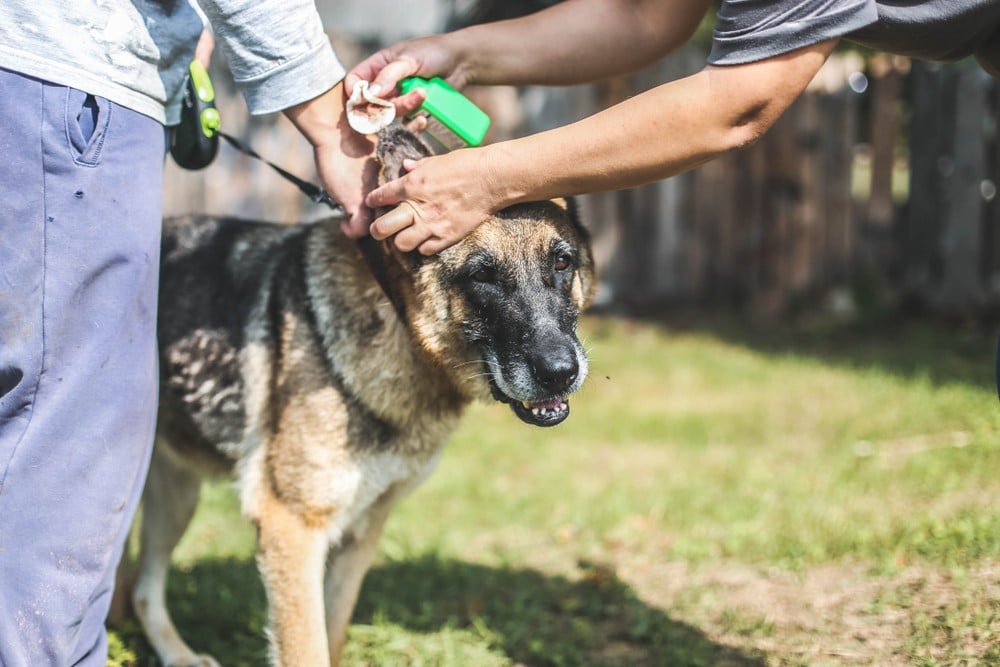If you are quite observant with dogs, you notice that German Shepherds’ ears tend to stand up pretty straight. However, if you had ever had a German shepherd dog right from when they were young, you will notice that these breeds of dogs begin as dogs with floppy ears. While this is the case, there are some owners of German Shepherds who do not like this. This set of people want their German shepherd puppies to have ears that stand up straight away.
Furthermore, these groups of people often wonder if they can do anything to make the dog’s ears stand straight.
Contents
When do German Shepherds begin to have straight ears?
The moment that your puppy is past the teething stage (this is about 20 weeks old); his ears would begin to stick up. This phenomenon could be partial or full. But one question that people tend to ask is how come it takes such a long time to get the ears to pick up?
The answer is quite simple as it is a biological one. As puppies, German Shepherds are known to have pretty large ears. These ears do not stand up because the ear’s cartilage lacks the required strength to support large ears’ weight. However, as time goes on, the dogs become older and are given proper nutrition.
When the dogs begin to wean out of their teething phase, the ears fluctuate between pointy and floppy. There could be instances when the ears perk up due to a sharp sound, but the ears soon fall quickly.
If your dog can pick up its ears within the first five months, which is at the onset of the teething stage, then the ears may be pointy and straight throughout the dog’s life.
How long does this take?
There are individual dogs that will take longer to get their ears to stand up. It is well known that puppies from the same litter have been known to take different times to develop this quality
There are individual dogs that could take as much as seven months trying to grow their ear. If the dog’s ears refuse to stand up by the eighth and the ninth month, then it means that the dog most probably will not have ears that stand up. This stage (between the eighth and the ninth month) is when the ears of a majority of German Shepherds have their ears take a permanent form.
Reports have shown that about 75% of examined dogs get their ears standing up within the first three to ten months. These reports also indicate that almost one out of five German Shepherds won’t have straight ears. The number is usually higher than most people tend to expect.
How do I check if my dog has a defect that stops its ears from standing up?
The rule of thumbs here is that you need to wait for five months for the dog’s ears to pick up. If you have the dog’s ears still falling after the first five months, this may mean that either the dog has not been fed with the right nutrition or the ears mites are not properly developing.
To help your dog with the proper nutrition, there are certain things you can do in this regard. You should give the dog food that richly contains vitamin D, calcium, and protein. If you know that you have not been letting the dog have these nutrients from their puppy diet, you have to switch it up. It would help if you moved to give the puppy a high-quality diet. But, if you are deeply concerned about the ears not standing up, perhaps you should take the dog to your vet.
But from my experience, a majority of floppy ears in German Shepherds are due to non-standard genetics. It is barely due to improper nutrition. Dog owners could think that taping can help improve the problem; however, this is not always the solution since the dog’s biological makeup cannot be corrected.
However, if you do not mind the puppy having floppy ears at five months, it is not something to be worried about.
How do I help my dog to get pointy ears?

1). You should keep your puppies away from other dogs or puppies that like to tug or bite on other dog’s ears. If you let this happen to your dog, it could damage its cartilage and prevent both ears to stand up properly.
2). It would help if you talked to your family members, especially children, on how to handle the dog more gently.
3). If you spot dirt in the dog’s ears, you should get a wet cotton ball and carefully clean this out. You should avoid sticking things down the dog’s ear canal. If there is wax in the dog’s ears, it should be cleaned off by a professional vet immediately.
4). You should engage the dog in play and other fun stuff. If your dog is happy and healthy, it will thrive. This will make the ears perk up rather quickly. You should, however, like the dog whether it has floppy or pointy ears. It is not much of a problem in the grand scheme of things if your dog has ears that do not pick up.
Conclusion
Most German does not have their ears pick up until a certain age. However, most dog owners typically get anxious if they do not get pointy ears in their dogs soon enough. This guide acts as an information resource to guide dog owners in different scenarios involving their dog ears.

